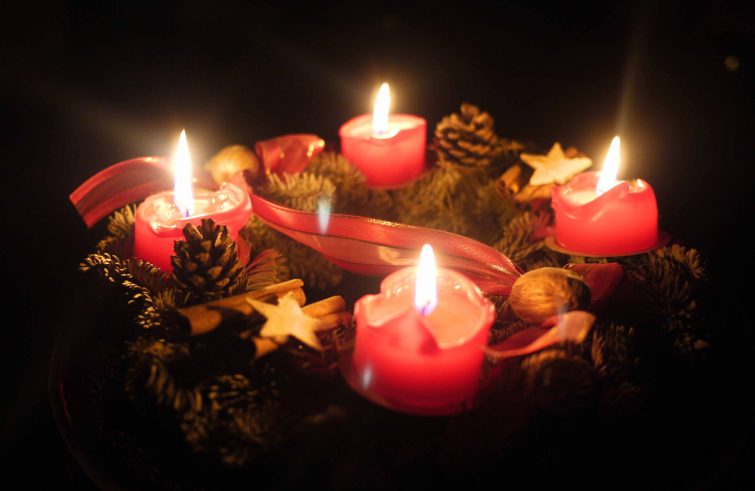
Weeks of anticipation and Christmas preparations. The season of Advent has begun and at a time of COVID-19 and its limitations the current situation affecting the lives of Christians takes on a virtual face, and the faith community migrates online. Livestreamed Masses, now a widespread practice, along with spiritual resources increasingly available online over the past years, are coupled by digital innovations to make up for the impossibility to practice Christmas traditions in person due to physical distancing measures and limited access in churches.
From France to Ireland… Advent calendars – published on line every day to enrich the days leading up to Christmas – are naturally in abundance and are nothing new. Just to give a few examples, the diocese of Paris proposes a passage from “Fratelli tutti” every day with a short clip featuring a phrase from Pope Francis’ new encyclical; every day the diocese of Valence, also in France, posts a video of a person carrying out a service for the diocese to “discover the richness and diversity of Catholic life in everyday life, whether or not in isolation.”
The French bishops offer an phone app featuring a daily “spiritual resource.”
The Irish bishops’ website likewise provides new content every day, ranging from liturgical readings, accompanied by an “audio-thought”, a passage from “Fratelli tutti”, a hymn, and the possibility to share beautiful thoughts through social networks under the slogan “#SharingHope”, to create a community of hope even at a distance, while the Irish parish of Cobh offers a “calendar of kindness.”
Retreats, prayers and podcasts. Retreats, days of silence, prayer, meditation and communal sharing, usually held in parishes during the Christmas season, are now available online, offered, among others, by the diocese of Reims, from 6 to 10 December. Those registering for the events will receive a thought to start the day, a podcast on guided prayer, an Advent song for reflection and meditation, the texts of the various daily prayers (Praise, Vespers, Mass) with online evening meetings to share testimonials and reflections …
Germany: one large choir. Every German diocese has an Advent calendar. For instance, the Aachen diocese calendar encourages the faithful to “be supportive of one another” and to open a small window every day showing the face of a missionary or volunteer from the diocese who describes life and Christmas in a distant country.
Along with the calendar, the Archdiocese of Freiburg launched the “sing with us for Christmas” initiative :
since choir singing is not allowed at present, all the faithful of the archdiocese are invited to record their voices and images online using Christmas carols as backing tracks; vocal and video entries will be edited so as “to form part of a large choir.”
Archbishop “in exile”. The Archbishop of Misnk (Belarus) Tadeusz Kondrusiewicz, barred from return to Belarus by the Belarusian authorities and thus in Poland for weeks already, is holding an online spiritual retreat from Thursday, December 3 to Sunday, December 6, “for the faithful of the cathedral parish and all those who wish to join them. However, he pointed out that the initiative was conceived “not simply because of COVID-19.”
St. Nicholas and the children. Unbridled imagination for the Feast of Saint Nicholas, who on December 6 goes from house to house to bring small gifts to children and bless them. This year the holy bishop faces great difficulties because he cannot enter homes or form gatherings in the streets. Nevertheless, this tradition, popular in the German-speaking world, will prevail over COVID-19. In fact a number of parishes have already announced that the Saint will appear at Mass (December 6th falls on a Sunday this year); others have prepared itineraries with a rigorous schedule throughout the parish and children will be able to greet him from the window or go down the street as he passes by, but keeping a distance from the shepherd’s crook that Saint Nicholas always brings with him.
“Online visits” are being proposed in a number of contexts. For example, the Diocese of Essen has organized 90 30-minute videoconferences:
kindergartens and groups of families have booked their visit held online from 4 to 7 December. All available dates were booked. In Austria, where a strict lockdown is in place until January 6, St. Nicholas is authorized to circulate and stop on doorsteps in compliance with all health and distancing regulations.
Spain: the “Posadas” tradition. A similar situation this year affects the Hispanic Posada tradition, whereby two people dressed up as Mary and Joseph lead a procession through the streets in search of a safe refuge where Mary can give birth to the baby Jesus. The Spanish website of the Catholic Relief Service proposes three events on its Zoom platform: we will “virtually come together and celebrate as a big family”: there will be prayers and songs, a quiz to test one’s knowledge of Christmas and win prizes. The invitation: “before logging on, prepare your tambourines to sing.”
Nativity scene in Austria, St. Lucia in Scandinavia. Visiting nativity scenes is difficult at a time of COVID-19. This year, one of the largest nativity scenes in the world, that is also over one hundred years old kept in the Mariendom in Linz, Austria, can be experienced also online, as 30 of the eighty statues that compose it are being digitized. As regards the tradition of Saint Lucia, celebrated on December 13, it somewhat depends on where lives the marvellous little girl that illuminates the Nordic night wearing a crown of lit candles on her head. In Sweden, where strict restrictions are now in place, Lucia will be allowed to go to schools, class by class, to greet the children, but without the presence of parents and the traditional party. The many concerts that traditionally resound in the name of the Saint on Christmas eve will be offered online in Sweden, enabling people to listen to them in their own homes and not in churches, as was the custom.









